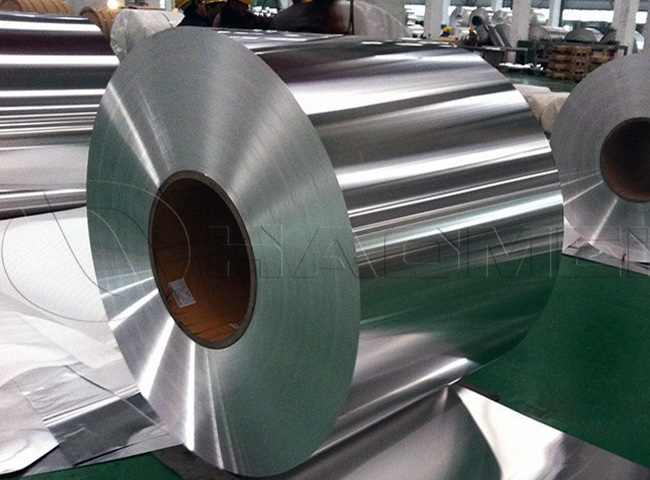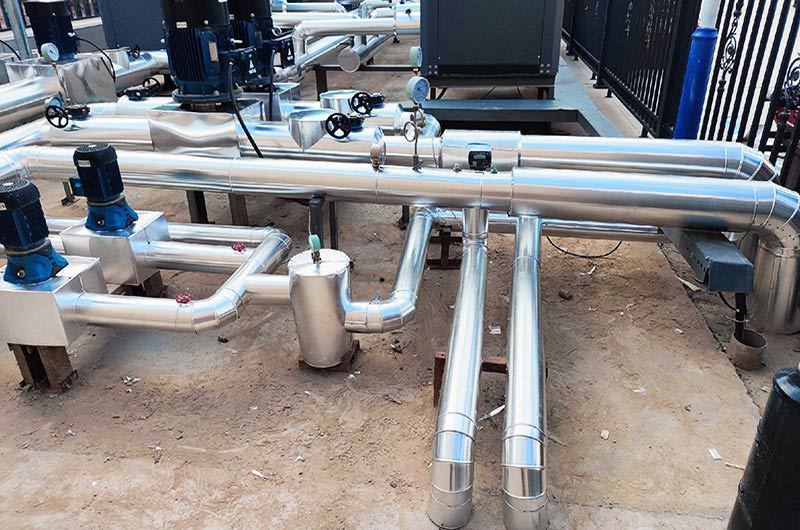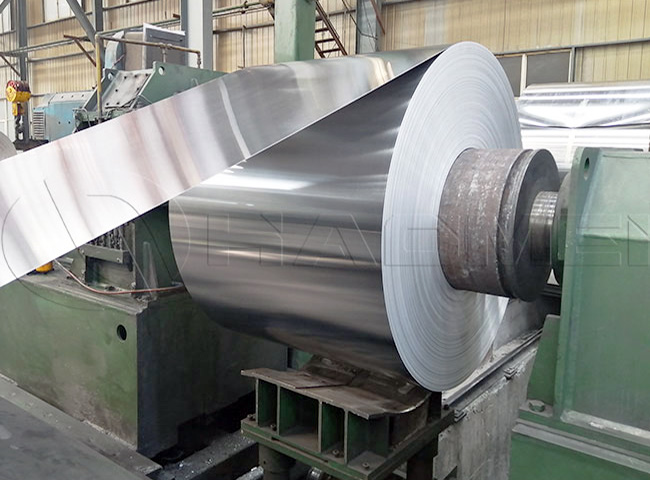- Key Features of Aluminum Coils for Thermal Insulation
- Benefits of Using Aluminum Coils for Thermal Insulation
- Specifications of Aluminum insulation aluminum coil
- Typical Aluminum Coil for Thermal Insulation
- Differences Between Alloys
- How to Choose Aluminum Coil for Thermal Insulation
- Applications of Aluminum Coils for Thermal Insulation
- Information related to thermal insulation aluminum coils
Aluminum coils for thermal insulation are specifically designed to enhance the insulation properties of a structure, making them a popular choice for various applications in the construction industry.
These coils are commonly used for insulating roofs, walls, and other surfaces to improve energy efficiency and maintain comfortable indoor temperatures.
Let's explore the key features, benefits, and applications of aluminum coils for thermal insulation:
Key Features of Aluminum Coils for Thermal Insulation
1. Reflective Surface
Aluminum has a highly reflective surface that efficiently reflects radiant heat. This property is crucial for thermal insulation as it helps to prevent the transfer of heat into or out of a building.
2. Lightweight
Aluminum is a lightweight material, making it easy to handle during installation. The lightweight nature of aluminum also contributes to the overall energy efficiency of a structure.
3. Corrosion Resistance
Aluminum naturally forms a protective oxide layer, providing excellent resistance to corrosion. This is important for long-term performance, especially in outdoor applications.
4. Malleability and Formability
Aluminum is malleable and can be easily formed into various shapes. This property allows for the creation of customized insulation solutions to fit specific architectural designs.
5. Ease of Installation
The coil form allows for convenient transportation, handling, and installation. Aluminum coils for thermal insulation are designed to be user-friendly, making the insulation process more efficient.
6. Durability
Aluminum is a durable material that can withstand environmental factors, ensuring the longevity of the thermal insulation system.
7. Non-Toxic and Recyclable
Aluminum is a non-toxic material, making it safe for use in construction. Additionally, it is highly recyclable, contributing to sustainability goals in the construction industry.

Benefits of Using Aluminum Coils for Thermal Insulation
1. Energy Efficiency
The reflective properties of aluminum contribute to improved energy efficiency by reducing the absorption of heat. This is particularly beneficial in hot climates, where minimizing heat gain is crucial for maintaining comfortable indoor temperatures.
2. Cost Savings
Enhanced energy efficiency often leads to cost savings in heating and cooling expenses. The initial investment in aluminum coils for thermal insulation is often outweighed by the long-term savings in energy bills.
3. Environmentally Friendly
Aluminum is a sustainable and environmentally friendly material. Its recyclability and energy-efficient properties align with green building practices and environmental sustainability goals.
4. Customization
Aluminum coils can be tailored to meet specific insulation requirements. Whether it's for a residential, commercial, or industrial application, the flexibility of aluminum allows for customized solutions.
5. Weather Resistance
Aluminum's corrosion resistance ensures that the insulation material remains effective even in harsh weather conditions, contributing to the durability of the overall building envelope.
Specifications of Aluminum insulation aluminum coil
| Alloy | 1100, 1050, 1060, 3003, 3105, 5005, 5052, etc. |
|---|---|
| Standard | ASTM, B209, EN573-1 |
| Temper | H14, H16, H24, H26 |
| Thickness | 0.4mm - 1.5mm |
| Width | 914mm, 1000mm, 1200mm, 1219mm and other available widths. |
| Length | according to customer requirements |
| Surface | smooth, orange peel embossed, corrugated, polysurlyn moisture barrier aluminium Jacketing, composite kraft paper, etc. |
| Inner diameter | 75mm, 150mm, 305mm, 405mm, 505mm with or without paper core |
| Outer diameter | according to coil weight or customer requirements |
Insulating aluminum coils are an important component in a variety of industrial and construction applications where thermal insulation and corrosion resistance are crucial. These versatile materials come in different varieties, but the two most common options are 1060 insulated aluminum coils and 3003 insulated aluminum alloy coils.
Typical Aluminum Coil for Thermal Insulation
Aluminum coils for thermal insulation are typically made from specific aluminum alloys that are well-suited to enhance insulation properties.
The choice of alloy can influence factors such as thermal conductivity, reflectivity, and durability.
Here are some commonly used aluminum alloys in coils for thermal insulation, along with their differences and considerations for choosing the right one:
1050 Aluminum Coil for Thermal Insulation
Properties:
- Excellent thermal conductivity
- High reflectivity
- Good corrosion resistance
Applications:
Often used in applications where thermal conductivity and reflectivity are critical, such as thermal insulation.

1100 Aluminum Coil for Thermal Insulation
Properties:
- Good thermal conductivity
- Excellent corrosion resistance
- High reflectivity
Applications:
Suitable for thermal insulation applications where a balance of thermal performance and corrosion resistance is required.
3003 Aluminum Coil for Thermal Insulation
Properties:
- Good thermal conductivity
- Excellent formability
- Moderate strength
Applications:
Used in various applications, including thermal insulation, due to its balance of properties.
5005 Aluminum Coil for Thermal Insulation
Properties:
- Moderate thermal conductivity
- Good corrosion resistance
- Suitable for anodizing
Applications:
Used in thermal insulation and other applications where a balance of properties is desired.

Differences Between Alloys
1. Thermal Conductivity
Alloys like 1050 and 1100 have excellent thermal conductivity, making them effective in preventing heat transfer.
2. Reflectivity
Both 1050 and 1100 alloys exhibit high reflectivity, reflecting radiant heat and contributing to thermal insulation.
3. Strength
Alloy 3003 has moderate strength, which may be a consideration in applications where some structural support is needed.
4. Formability
Alloy 3003 is known for its good formability, which can be advantageous in applications where shaping is required.
5. Corrosion Resistance
Alloys 1100 and 3003 offer good corrosion resistance, ensuring durability in outdoor applications.
How to Choose Aluminum Coil for Thermal Insulation
1. Thermal Performance Requirements
Consider the specific thermal performance requirements of the application. If high thermal conductivity is crucial, alloys like 1050 or 1100 may be preferred.
2. Reflectivity
Reflectivity is essential for preventing heat absorption. High-reflectivity alloys, such as 1050 and 1100, are suitable for applications where minimizing heat transfer is a priority.
3. Formability
If the aluminum coil needs to be shaped or molded to fit specific design requirements, consider alloys with good formability, such as 3003.
4. Strength Requirements
Evaluate the strength requirements of the application. If structural support is needed, an alloy like 3003, with moderate strength, may be a suitable choice.
5. Corrosion Resistance
Assess the environmental conditions to which the insulation will be exposed. Alloys like 1100 and 3003, with good corrosion resistance, are suitable for outdoor applications.
6. Cost Considerations
Balance the desired properties with budget constraints. Different alloys may vary in cost, and selecting the most cost-effective option for the application is important.
Applications of Aluminum Coils for Thermal Insulation
1. Roof Insulation
Aluminum coils are commonly used to insulate roofs, reflecting solar radiation and reducing heat absorption. This is particularly important in warmer climates.
2. Wall Insulation
Aluminum insulation is applied to walls to prevent heat transfer and enhance the thermal performance of the building envelope.
3. Duct Insulation
In HVAC systems, aluminum coils are used to insulate ductwork, reducing heat loss or gain during the distribution of conditioned air.
4. Pipe Insulation
Aluminum insulation is also applied to pipes to control temperature variations and prevent energy loss in plumbing systems.
In conclusion, aluminum coils for thermal insulation offer a range of benefits, including energy efficiency, cost savings, and environmental sustainability.
The choice of the right aluminum coil depends on factors such as reflectivity, thickness, surface finish, and compliance with standards.
Information related to thermal insulation aluminum coils
- Exterior Pipe Insulation Jacket
- Piping Insulation Specifications
- Chilled Water Piping Insulation
- 1060 aluminum car insulation
- Metal Cladding For Pipe Insulation
- Generator Exhaust Pipe Insulation
- Exhaust Pipe Insulation Jacketing
- Condenser Water Pipe Insulation
- 3003-h14 aluminum coil for insulated pipes
- 1050 aluminum plate for hose insulation pipes
- 3003 h24 aluminum plate coil for thermal insulation
- 0.5mm thick 3003 aluminum coil for insulated pipes
- 0.7mm thick 1060 thermal insulation aluminum coil
